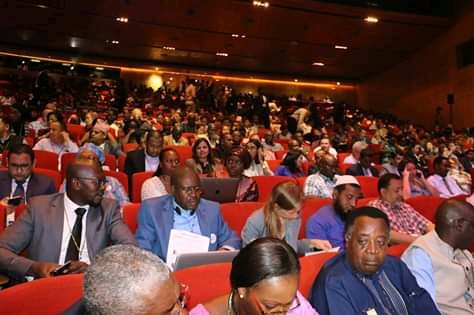
Sanitation Crisis In Africa
“No Data on Hygiene and 0.5% of GDP to Sanitation not met” 2018 Progress Report on Ngor Commitments shows.
By Diana Coker
The first ever joint Africa Sanitation (AfricaSan5) and Feacal Sludge Management (FSM5) Conference held in Capetown, South Africa from the 18th to 22nd February 2019. was an important gathering of all stakeholders that contribute to sanitation within the continent and was designed to positively impact the lives of people by ensuring that their sanitation and hygiene needs are adequately and sustainably addressed.
The event attracted Governments representative, Researchers, Investors, Innovators and other sector players across the continent who interfaced, formed partnerships in order to ensure that the ideas and knowledge gained from each other will be adequately utilized for the good of people in need of Sanitation services.
South Africa was chosen as an ideal country for the event because of the innovative approach to sanitation related issues within the continent.
President of the Africa Ministers Council on Water (AMCOW), Emmanuel Tony Ondo in his address to participant affirmed that the conference was a significant milestone of a long journey that African countries have embarked on for almost 20yrs ago in a bid to prioritize sanitation and hygiene in both global and national development
He recalled that AfricaSan process can be traced back from 2002 when it was first held in South Africa and their biggest achievement was to successfully lobby the development community through UNEP and the United Nations to adopt a specific development target for sanitation which was captured in the Millennium Development Goals, adding that since then, the AfricaSan process has developed into a continental platform to generate political momentum to sanitation and hygiene.
Sanitation, Hygiene and access to drinking water is a priority in all the African governments globally through the Sustainable Development Goals, but however inasmuch as they have agreed to the fact that it is a human rights issue, they have still not been able to achieve it as many Africa countries are yet to provide sanitation for all their citizens. However, moving forward with the implementation of Sustainable Development Goals it is hoped that they will be able to achieve their set targets far more than they did with the Millennium Development Goals. Although it may be a complex challenge, as result of other related issues like climate change, migration to cities, but the bottom line is that they must find sustainable solutions regardless of the challenges they are experiencing. Sanitation is dignity and must be provided especially for women and girls.
The African ministers Council on Water at AfricaSan4 in Dakar Senegal in 2015, held before the inception of the SDGs realized the need to develop and endorse the ten Ngor Commitments which all African governments are expected to meet in order to
achieve universal access to sustainable sanitation and hygiene services and eliminate open defecation by 2030.
A member of the AMCOW Secretariat, Kitch Bawa in presenting the outcomes of the monitoring of the Ngor Commitments on Sanitation and Hygiene which he described as the “center piece” of AfricaSan, informed the audience that the report was compiled and presented by the AfricaSan International task force, made up of key stakeholders, within the Africa Sanitation space.
The Africa-San International Task Force, he said, was restructured in 2017 to make it more effective to support sanitation across the continent and is consist of a sub-committee on monitoring, validation and reporting with a work plan that involves consultation with member states and ensure what is gathered is validated.
“We have 42 indicators in the Ngor Commitments divided into two stages and a clear-cut vision.
The first indicator – stage one, monitors the enabling environment, whilst the second indicator – stage two is different from one country to another and focuses on individual country’s set target. The vision indicator which tracks access to safely managed sanitation and hygiene and ending open defecation.
Giving a PowerPoint overview presentation of the performance on African countries through an analogy of traffic lights on the scoring of progress on the commitments, the red light showed very bad progress or no progress at all, yellow (Amber) showed some progress and green showed good progress. According to him, Africa has made very little progress from the chart as the yellow and red were visible every were, whilst the green was not that visible.
The result reached following the Monitoring of the Ngor commitment provided the good news that the green light showed that there is very good progress that has been made on leadership and coordination which shows that increasingly across the continent more countries have identified ministries that leads Sanitation and Hygiene, and key stakeholders within the countries come together to share and learn from one another to move the sanitation sector forward.
However, the bad news is that they have done very poorly in the area of eliminating inequalities and access to sanitation services as governments are yet to look at how to provide access to sanitation services for the neglected poor, the downtrodden and people down the lowest quintile which happens to be the first Commitments.
He further disclosed that they have also done very badly on the issue of financing, as
in 2008 when the Etiqwine Commitments were endorsed, there was a commitments made to allocate at least 0.5% to sanitation, but that up to the end of 2015 very little progress was made in that regard. This situation up to 2018 when the report was compiled has not changed as no progress has been recorded so far.
“It is even worse when it comes to the issue of safely managing sanitation and encouraging its productive re-use. It is really worse and it is for this reason we brought AfricaSan and FMS together so that by learning from each other, we can go back and see how we can encourage productive use of sanitation across the continent,” Kitch Bawa said, adding, “We did very poorly in the area of creating enabling environment and therefore the country targets were not met. We expect that as we work towards improving the enabling environment we would begin to ensure that countries meet the target they set by themselves.”
The vision’ he furthered, is access to safely managed sanitation and hygiene for all and ending open defecation. The situation, he said, is very poor as less than half of the people in most African countries use at least basic sanitation facilities and open defecation remains very high as more than half of the people living predominantly in rural areas in 14 countries practice open defecation. “We are even far worse in the area of addressing the issue of hygiene as we discovered that many countries do not even have data,” he disclosed, adding that only 37 countries have data on hygiene.
In conclusion, Kitch Bawa stressed on the need to work hand in gloves, share and learn from one another and strengthen the multi-stakeholders partnership in order to ensure that everyone in Africa has access to safely managed sanitation and hygiene and eliminate open defecation.
—
PR/Communications Specialist
+23276635830



